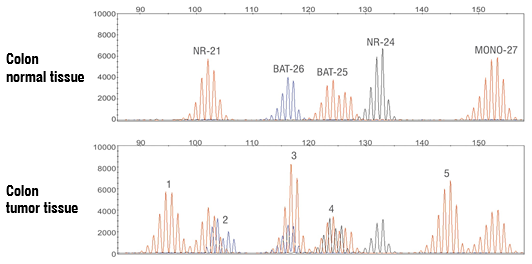
Microsatellite Instability Assay
Microsatellite Instability (MSI) assay utilizing multiplex, fluorescent PCR and capillary electrophoresis to enable sensitive detection of five mononucleotide repeat markers
Microsatellite instability (MSI) results from an accumulation of insertion or deletion of repeating units during DNA replication in tumor cells with a deficient mismatch repair (MMR) system. MSI status is associated with response/resistance to certain immune checkpoint inhibitors.
IQVIA MSI assay utilizes multiplex, fluorescent PCR and capillary electrophoresis to enable sensitive detection of five mononucleotide repeat markers (BAT-25, BAT-26, NR-21, NR-24 and MONO-27) in tumor FFPE specimens. Microsatellite instability at two or more mononucleotide loci is interpreted as MSI-High; microsatellite instability at a single mononucleotide locus is interpreted as MSI-Low; no instability at any of the loci tested is interpreted as microsatellite stable (MSS).
Example of Colon Cancer FFPE Tissue Specimen Demonstrating MSI-High Status

MSI Assay Specifications |
|
|---|---|
| Markers | BAT-25, BAT-26, MONO-27, NR-21, and NR-24 microsatellite loci |
| Specimen Requirements | Tumor: 3 x 5um FFPE tumor slides or 3 curls or FFPE block or DNA. Minimum 20% neoplastic cellularity required. Normal: either whole blood (1-3 mL, K2EDTA) or tumor FFPE slides with clearly indicated normal tissue area or 3 x 5um normal tissue FFPE slides, curls or block. If H&E stained slide with indicated tumor normal areas is not available, will perform H&E assessment and determine specimen adequacy. |
| Assay Method | OncoMate® MSI Dx Analysis System |
| System Compatibility | Thermo Fisher Scientific SeqStudio Flex |
| Regulatory Tier | RUO, GCP, CAP-CLIA |
| Deliverables | MSI Status report. Exact number of MSI markers available as custom report. |
Related Services

Clinical Genomics Laboratory Services
Learn more
Next Generation Sequencing Services
Learn more
Immune Landscape Signatures
Learn more













